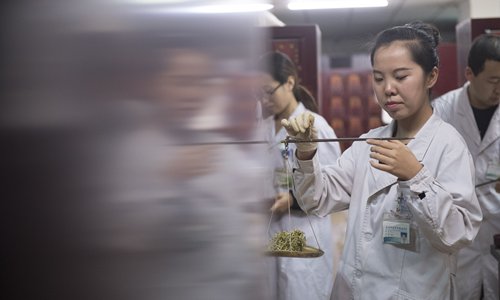
A TCM doctor weighs herbal medicines at a clinic in Shanxi in 2017 (Photo: Global Times)
The mother of a 17-year-old Russian girl who was unable to walk or speak due to poor brain development has expressed gratitude to Traditional Chinese Medicine (TCM) after her daughter recovered at the China Rehabilitation Research Center last year.
The girl's doctor, Sun Yingchun, director of the center's TCM treatment department, told the Global Times that the girl came to the center in 2015 and received various forms of TCM treatment including acupuncture, massage and steaming with herbal medicine.
Sun's department treats over 20 patients from countries including Russia, South Africa, India, and Kazakhstan every year using TCM for ailments such as spinal cord injuries and lumbar disc herniation.
Her department is a prime example of TCM providing international medical services. Rooted in ancient Chinese philosophy, TCM has, in recent years, gained popularity in a world dominated by modern Western medicine.
However, analysts believe that TCM treatment still faces major challenges when it comes to providing international services. Facing fierce competition from other Asian countries, China lacks professional TCM practitioners who are capable of speaking foreign languages, and still does not meet professional international standards in TCM treatment and quality standards of TCM and herbal medicines for export.
Range of services
The foreign patients who came to seek help from Sun were particularly interested in acupuncture, Sun said.
"We don't just offer TCM treatment. We also help foreign patients return to their families and return to society," Sun said.
Because many foreign patients come for treatment on tourist visas, the center helps them extend their visas, contact tourism agencies to plan their travels, rent apartments for patients' families and friends, and in some cases even provide career advice.
While receiving treatment at the center, the Russian girl learnt to make silk flowers and was able to sell them through online platforms to earn money to support her family, according to Sun.
In 2017, 15 Beijing TCM hospitals were included in a TCM package for international tourists. These packages featured effective treatment and comprehensive services at a reasonable price, and offered tourism programs for patients during their stay in Beijing, the Xinhua News Agency reported.
According to a document issued by the National Tourism Administration and the State Administration of TCM, China will establish 10 national TCM tourism demonstration areas, 100 TCM tourism demonstration bases and 1,000 TCM tourism demonstration projects over three years.
Beginning stages
During this year's annual session of China's top legislature, Fang Jianqiao, deputy to the 13th National People's Congress and president of Zhejiang Chinese Medical University, submitted a proposal to boost TCM's international services, according to news site thepaper.cn.
Fang believes that international TCM services are only in their initial stages and currently face many challenges.
Many Western countries have taken trade protection measures over technical standards and put up green barriers to restrict the imports of TCM products, and some Asian countries including Japan, South Korea and India have been investing heavily in TCM development and promotion in recent years, Fang said.
Wang Zemin, a TCM doctor at Wangjing Hospital of the Chinese Academy of Chinese Medical Sciences in Beijing, has specialized in treating tumors and blood diseases using TCM methods for over 30 years. He has seen many foreign patients travel to China specifically for TCM treatment.
As TCM's country of origin, exporting TCM products could be an economic development point for China, but Japan now occupies 80 percent of the global TCM market share, Wang told the Global Times.
"That's because Chinese herbal medicine farmers use excessive chemical fertilizers, which have greatly affected the export of TCM products," Wang said.
He also blamed current TCM education in China, as many TCM universities focus more on Western medicine courses, and their graduation assessment relies heavily on writing papers instead of practical TCM treatment.
Sun, a TCM practitioner who also speaks Russian, believes TCM education in China should also place emphasis on foreign language courses to provide international services for foreign patients.
With regard to TCM treatment, Sun suggested that China come up with unified practice standards, as some TCM practitioners in places such as South China's Hainan Province sometimes deceive foreign patients by giving unprofessional treatment.


